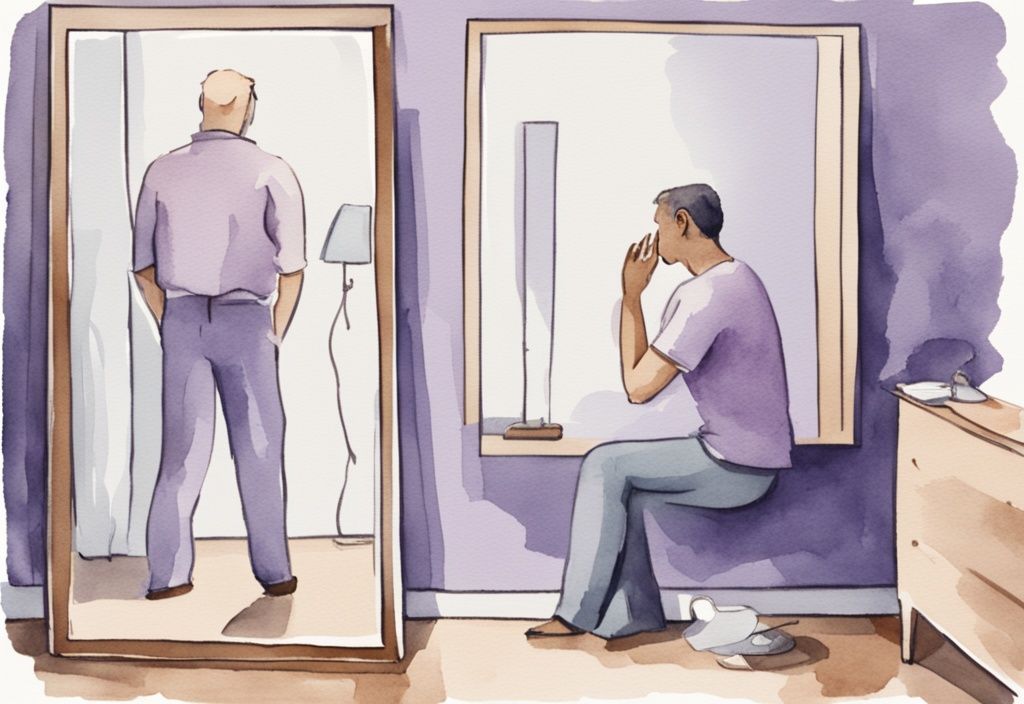Navigating Effects of Being Married to a Narcissist Wife: Insight & Advice
Does your wife’s overwhelming need for attention leave you feeling like your life is an emotional tornado? If you nodded in agreement, you might be grappling with the exhausting realities of being married to a narcissist wife. This journey, marred by manipulation, misplaced blame, and an empathy deficit, can leave you feeling isolated and emotionally drained.
In this comprehensive guide, we’ll explore the multi-layered impact of living with a narcissist spouse. From the psychological toll it takes on you and your family, to the ripple effects felt in your future relationships, we delve deep into the domestic battleground of narcissism.
Most importantly, we’ll illuminate a path forward, providing practical strategies that can help you navigate the labyrinth of emotional turmoil, reclaim your life, and find your way to healing.
Emotional and Psychological Effects
Being married to a narcissistic wife can profoundly disrupt your mental and emotional health, creating a complex web of challenges that often feel insurmountable. The effects of living with a narcissist permeate through every layer of your emotional and psychological well-being, making it imperative to explore these impacts in depth.
Impact on Emotional Well-Being
- Emotional well-being can be significantly compromised, often leaving you feeling perpetually neglected and unimportant.
- Emotional neglect is prevalent due to the narcissist’s inherent lack of empathy and emotional support.
- You may endure chronic anxiety and frequent panic attacks because you’re constantly “walking on eggshells” around the narcissistic wife.
Imagine the feeling of being in a constant state of emotional limbo, where your needs are consistently sidelined. This chronic neglect chips away at your emotional resilience, making recovery a daunting task.
Mental Health Consequences
- Extended periods of criticism, invalidation, and erratic emotional behavior can cause anxiety, depression, and post-traumatic stress disorder (PTSD).
- Emotional exhaustion and chronic stress arise from the relentless conflict and tension within the relationship.
- Gaslighting, a frequent tactic used by narcissists, severely impacts mental health by inducing confusion and self-doubt.
Picture yourself in a scenario where your reality is constantly questioned; this form of manipulation can leave you feeling like you’re losing your mind. The relentless bombardment of negative feedback can wear down your mental defenses, making everyday life a struggle.
Effects on Self-Esteem and Self-Worth
- Consistent manipulation, belittlement, and criticism gradually deteriorate self-esteem and self-worth.
- You may often lose your sense of identity and individuality amid the pervasive emotional abuse.
- Prolonged exposure to such toxic behavior can lead to feelings of worthlessness and deep depression.
Think of your self-esteem as a delicate flower; under the harsh light of a narcissistic relationship, that flower wilts. The constant barrage of negativity and devaluation can make you question your worth, leaving deep emotional scars.
Recovery from the psychological and emotional turmoil inflicted by a narcissistic spouse is a journey. It requires resilience, support, and the recognition that these effects, though profound, do not define you. By understanding the depth of these impacts, you take the first step toward healing and reclaiming your life.
Patterns of Narcissistic Abuse
Cycles of Abuse and Reconciliation
The effects of being married to a narcissist wife often arise from a perpetual cycle that swings between abuse and short-lived reconciliation. This pattern keeps you trapped, finding it increasingly difficult to break free from the relationship. Imagine being on an emotional roller-coaster, experiencing extreme highs and lows, often in quick succession. You might feel momentarily cherished, only to be abruptly plunged into a sea of criticism and hostility. These unpredictable shifts leave you perpetually off-balance, heightening your anxiety and dependency.

Manipulation, Control, and Belittlement
Your narcissistic spouse might exert overwhelming control over many aspects of your life, from your social interactions to your finances and even your personal beliefs. This level of control erodes your independence and self-confidence. Constant manipulation and belittlement further chip away at your self-esteem. Over time, you start to feel devalued and insignificant, increasingly losing confidence in your own judgment and abilities. For more insight into this behavior, check out these narcissist mental abuse quotes. The effects of being married to a narcissist wife can lead you into a profound identity crisis, making it challenging to reclaim your sense of self.
Gaslighting and Reality Distortion
Gaslighting is a particularly sinister form of psychological manipulation that your narcissistic spouse might use. This tactic leads to profound confusion, causing you to question your own reality and sanity. Your spouse might deny, distort, or even fabricate information, convincing you that your perceptions are inaccurate. This relentless undermining of your reality leaves you in a state of perpetual doubt and mental exhaustion. The long-term effects of being married to a narcissist wife can result in significant emotional and cognitive distress.
Blame-Shifting and Emotional Manipulation
Blame-shifting is another common tactic used by narcissistic spouses to avoid responsibility. This maneuver forces you to shoulder the blame for issues that aren’t your fault, generating feelings of guilt and self-blame. Emotional manipulation further deepens these feelings, creating an environment of confusion and self-doubt. You may feel responsible for your spouse’s problems, which reinforces your dependency and weakens your ability to stand up for yourself. Recognizing the effects of being married to a narcissist wife is crucial for identifying these destructive patterns and seeking help.
Physical and Safety Concerns
Two of the most pressing issues that come with being married to a narcissistic wife are physical and safety concerns. These can manifest in alarming ways, from physical and sexual abuse to the general unpredictability of living with a narcissist, which can drastically affect your sense of security and well-being.
Physical and Sexual Abuse
- Impact on Physical Safety and Bodily Autonomy: Narcissistic abuse isn’t confined to the emotional realm; it often seeps into physical and sexual territories. Imagine living in a perpetual state of fear because your physical safety has been compromised. It strips away your bodily autonomy, leaving deep scars that transcend the visible wounds.
- Increased Safety Risks: The unpredictability of a narcissistic wife’s behavior can be a ticking time bomb. Her mood swings and erratic actions may escalate into violent outbursts, putting you in danger. This constant threat compels you to stay hyper-alert, always wary of potential aggression.
Safety Risks and Aggressive Behavior
- Unstable Household Environment: Picture a home where the atmosphere is thick with chaos and instability. The erratic behavior of a narcissistic wife can transform what should be a sanctuary into a battlefield. This environment can be overwhelmingly distressing, filling you with anxiety and overshadowing every aspect of your daily life.
- Need for Safety Precautions: The potential for aggressive behavior necessitates taking safety precautions. Whether it’s something as straightforward as securing your personal space or as complex as creating an emergency escape plan, these measures become essential to safeguard your well-being.
Impact on Family Dynamics
Being married to a narcissistic wife can cause wide-ranging disruptions in family dynamics. From the emotional well-being of children to the social lives of spouses, the effects permeate every aspect of family life. Let’s delve into these effects to understand the profound changes that arise from living in a narcissistic environment.
Effects on Children
Children exposed to a narcissistic mother often endure emotional abuse, physical violence, and manipulation. These distressing experiences can leave deep scars on their mental health, self-worth, and emotional development.
- Emotional Abuse: Constant criticism and a lack of validation can cause feelings of worthlessness and low self-esteem in children. Without emotional support, they struggle to develop healthy emotional responses.
- Physical Violence: In severe cases, narcissistic mothers may resort to physical aggression, creating an atmosphere of perpetual fear and anxiety. This hostile environment severely damages a child’s sense of safety and trust.
- Manipulation: Narcissistic mothers often control their children through manipulation, distorting their sense of reality and fostering confusion and self-doubt. This can hinder their ability to form healthy relationships in adulthood.
- Lack of Empathy: The mother’s inability to empathize deprives children of essential emotional connections and support, impacting their psychological development and ability to empathize with others.
Isolation from Friends and Family
Narcissistic spouses frequently isolate their partners from friends and family, leading to heightened feelings of loneliness and helplessness. This isolation increases the spouse’s dependency on the narcissist, exacerbating emotional struggles and making it more difficult to escape the relationship.
- Social Isolation: By controlling interactions with the outside world, the narcissist ensures the spouse has limited support networks, reinforcing emotional and psychological control.
- Dependence Increase: As the spouse becomes increasingly reliant on the narcissist for validation and support, seeking help or imagining life outside the toxic environment becomes challenging.
- Exacerbated Emotional Struggles: Feelings of isolation amplify emotional pain and confusion, increasing the risk of depression and anxiety. The spouse may feel there are no other options.
- Limited External Perspective: Isolation prevents the spouse from receiving valuable perspectives from friends and family, which could help recognize the abuse and seek help, trapping them in the cycle of narcissistic control.

Challenges in Leaving the Relationship
Emotional Dependency and Fear of Retribution
Considering the effects of being married to a narcissist wife, one of the most profound challenges is the emotional web that binds you to her. The emotional dependency often developed in such marriages can feel like a heavy chain, making it hard to imagine life without her. She uses manipulative tactics to ensnare you in a belief that you can’t survive on your own. This emotional entrapment creates an almost insurmountable barrier to leaving, fostering a fear of the unknown and potential retaliation.
Fear of retribution is another daunting obstacle. A narcissistic wife might threaten severe consequences if you dare to leave, whether through public shaming, physical harm, or manipulation involving children. These threats aim to create an environment where you feel utterly trapped. Addressing these emotional and psychological barriers is essential for anyone grappling with the decision to leave, ensuring you understand that these challenges, although significant, are not insurmountable.
Socioeconomic and Financial Control
Financial control serves as a potent weapon, significantly impacting the effects of being married to a narcissist wife. The reach of this control is vast, touching every corner of your financial world and stripping away your economic independence. By commandeering all financial resources, she ensures you become economically dependent, rendering the idea of leaving daunting if not impossible.
The constraints don’t stop there. Restricting access to bank accounts, credit cards, and other financial resources, she can make sure you have minimal funds available to facilitate your departure. This economic stranglehold complicates securing necessary resources such as housing or legal assistance, critical to your journey toward independence. Overcoming this financial entrapment involves meticulous planning and the creation of a support network, which is vital for regaining control over your financial life.
Long-Term Consequences and Recovery
The enduring effects of being married to a narcissist wife can be profound, touching every aspect of your life. From emotional scars to disrupted future relationships, the journey to recovery is intricate but not impossible. This section delves into what to expect and how to approach the healing process.
Seeking Professional Help
When grappling with the effects of being married to a narcissist wife, finding professional help is a beacon of hope. Therapy isn’t just a series of sessions; it becomes a sanctuary where you can unravel the layers of emotional abuse you’ve encountered. Imagine it as a lighthouse, guiding you through the storms of complex feelings and offering tools to reclaim your mental well-being. Therapists, with their compassionate expertise, help identify the intricate web of narcissistic manipulation, while support groups become a comforting embrace, connecting you with others who have trodden this thorny path. Together, these avenues foster a nourishing environment for shared healing and growth.
Rebuilding Self-Worth and Establishing Boundaries
Emerging from the shadows cast by a narcissistic wife requires a deliberate effort to rebuild self-worth. Think of your self-esteem as a garden left unattended, now is the time to plant seeds of self-love and nurture them. Engage in activities that spark joy and fulfillment; whether it’s rediscovering long-lost hobbies or taking up new aspirations, each step is a testament to your intrinsic value. Adding to this, setting and maintaining boundaries is like building a sturdy fence around your personal sanctuary. It’s about learning the powerful art of saying “no” and ensuring that your emotional space remains protected. These practices not only shield you but also pave the way for healthier future interactions.
Impact on Future Relationships
The shadows of being married to a narcissist wife often loom large over subsequent relationships. Trust becomes a brittle thing, and the blueprint of what a healthy relationship looks like can get skewed. Imagine carrying a backpack of unresolved trauma into new beginnings, each unresolved issue becomes a boulder, making it hard to move forward freely. Navigating this terrain requires persistent effort and self-awareness. Through therapy, you can unpack these boulders, understand the roots of emotional manipulation, and learn to establish healthier dynamics. In essence, the aim is to transform these shadows into stepping stones, fostering connections that are balanced and enriching.
Conclusion
Experiencing the effects of being married to a narcissist wife can be overwhelming and far-reaching, permeating every aspect of a spouse’s life—emotional well-being, mental health, and family dynamics. Imagine being caught in a relentless storm of emotional abuse characterized by manipulation, control, and constant belittlement. It’s a crisis that exacts a heavy toll on one’s psyche, often manifesting as chronic stress, anxiety, depression, and sometimes even PTSD.
Family dynamics are equally ravaged, with children frequently becoming collateral damage, enduring emotional, and sometimes even physical, abuse from the narcissist’s unempathetic behavior. It’s an inhospitable environment that’s not just a backdrop, but a significant part of the ongoing trauma.
Your first step toward liberation and healing is to prioritize your mental and emotional health. Recognizing the pattern of abuse is crucial. Realizing that the cyclical nature of this manipulation isn’t your fault can be incredibly empowering. Seeking professional help offers immense benefits. Therapy provides a sanctuary to process your trauma and develop coping mechanisms that help rebuild self-worth and set personal boundaries.
Establishing healthy boundaries is another pivotal part of recovery. However, it’s crucial to recognize the potential dangers of certain personality types in your life. For example, understanding whether grandiose narcissists are dangerous can be an important step in protecting your mental health and well-being. In relationships with a narcissist, boundaries often blur or become nonexistent, leading to a loss of personal autonomy. By clearly defining these boundaries, you begin reclaiming your space and shielding yourself from further emotional harm. While it’s a challenging process requiring time, support, and determination, it is essential for long-term well-being.

Recovery extends beyond just leaving a toxic relationship; it’s about reconstructing a life that values your emotional and mental health. This journey means embracing self-love, establishing supportive relationships, and consistently working on your personal growth. Navigating out of narcissistic abuse is undeniably difficult, but with the right support and resources, moving towards a healthier, more fulfilling life is within reach.
FAQ
What are common characteristics of a narcissist wife?
Living with a narcissistic wife can be a profoundly challenging experience due to her distinctive traits that shape the dynamic of the relationship.
- Excessive need for attention and admiration: She relentlessly seeks validation, always needing to be the center of attention.
- Lack of empathy and emotional support: Your feelings often go unnoticed, as she struggles to show genuine concern for your emotional well-being.
- Frequent belittlement and criticism of the spouse: Expect regular undermining, where your worth is devalued through constant criticism.
- Control over financial and social aspects of the relationship: Access to money and social interactions are tightly regulated, often leaving you feeling trapped.
How does gaslighting affect the spouse of a narcissist?
Gaslighting is an insidious abuse tactic that can deeply affect the mental health of anyone. When employed by a narcissist, its effects can be particularly corrosive.
- It makes you question your reality and sanity, leading to significant confusion and self-doubt.
- The incessant manipulation contributes to intense emotional and mental exhaustion, wearing you down over time.
Can narcissistic behavior be changed with therapy?
Narcissistic behavior presents a particularly challenging dynamic in therapy. While change is not impossible, it heavily depends on certain factors.
- Behavioral change is possible if she recognizes her problematic behavior and is genuinely committed to addressing it.
- Professional therapy can be effective, but only if she actively participates and is willing to embrace the process.
What steps can one take to leave a narcissistic partner safely?
Leaving a narcissistic partner requires careful planning and a strong support network to ensure your safety and well-being.
- Seek support from friends, family, and professional services to build a solid network of assistance.
- Develop a clear, actionable plan and gather the necessary resources to execute a safe exit strategy.
- Establish financial independence to reduce your reliance on your narcissistic partner.
- Prioritize your safety and well-being by preparing for any potential retaliation or backlash.
How does being married to a narcissist affect future relationships?
Experiencing a relationship with a narcissistic partner can profoundly impact your ability to forge healthy connections in the future.
- You may find it challenging to trust others and to form genuine, healthy relationships.
- Setting and enforcing boundaries in new relationships might become difficult, as past experiences could influence your expectations and tolerances.
- The emotional scars from the previous relationship can significantly lower your self-esteem and confidence, which may take time to rebuild.














Post Comment